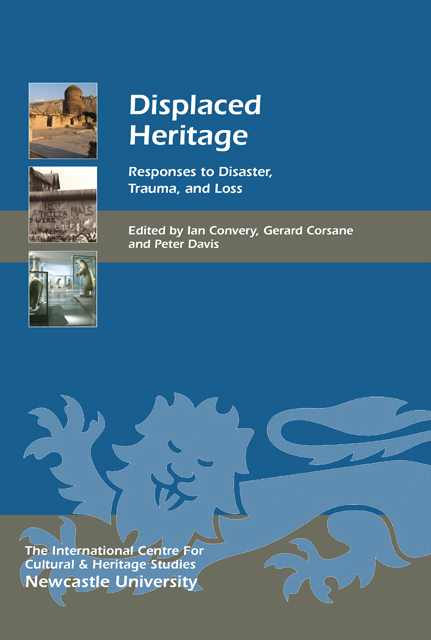Book contents
- Frontmatter
- Contents
- List of Illustrations
- Acknowledgments
- List of Abbreviations
- Preface
- Introduction
- Displaced Heritage: Histories and Tourism
- Displaced Heritage: Trauma, Confinement and Loss
- Displaced Heritage: Lived Realities, Local Experiences
- Displaced Natural Heritage
- Endpiece
- List of Contributors
- Index
- Heritage Matters
9 - ‘We shall never forget, but cannot remain forever on the battlefi eld’: Museums, Heritage and Peacebuilding in the Western Balkans
Published online by Cambridge University Press: 24 February 2023
- Frontmatter
- Contents
- List of Illustrations
- Acknowledgments
- List of Abbreviations
- Preface
- Introduction
- Displaced Heritage: Histories and Tourism
- Displaced Heritage: Trauma, Confinement and Loss
- Displaced Heritage: Lived Realities, Local Experiences
- Displaced Natural Heritage
- Endpiece
- List of Contributors
- Index
- Heritage Matters
Summary
Introduction
Since the break-up of the former Yugoslavia, the western Balkans has become synonymous with political chaos, war and ethnic tension. The area has been shaped and reshaped over centuries of displacement through occupation, migration and division. The resulting social, political, ethnic and religious complexities are both confusing and contested. The region has experienced an ongoing crisis; war, genocide, ethnic and cultural cleansing and mass migration have created a number of small countries, each now engaged in rapid nation-building. Economies and political structures are weak and corruption is endemic. Several substantial issues remain unresolved, notably the political status of both Kosovo and Bosnia Herzegovina, and tension around minorities and ethnicity in Serbia and Macedonia.
Destruction of cultural heritage was part of widespread ethnic and cultural cleansing as deliberate acts to obliterate traces of the enemy (Stone 2009, 320). Chapman (1994, 120) states: ‘in a cultural war, the conquest of territories and the “ethnic cleansing” of settlements is insufficient. Nothing less than the destruction of past historical identities is needed.’ He identified widespread destruction of cultural property including mosques, churches, cemeteries and museums. There were also calls for the removal of foreign or international words in order to purify languages (Goulding and Domic 2009, 97).
Identity, memorialisation and heritage have remained sharply in focus as part of the landscape of post-conflict reconstruction and cover a wide spectrum, ranging from appropriation for specific expressions of (contested) identity to efforts at reconciliation. Several international interventions in the region are supporting rebuilding and reconstruction of heritage, and there is an increasing focus on cultural tourism as an economic and social driver for recovery.
This chapter considers examples of heritage-based peacebuilding in the western Balkans through ongoing projects organised under the auspices of the Swedish foundation Cultural Heritage without Borders (CHwB). These examples show how steps towards peacebuilding can be achieved when external facilitation allows for ownership, connections and trust between individuals and institutions to develop organically. At the time of writing the author is engaged in the projects and has drawn on her own observations and the views and opinions of colleagues and participants.
Heritage and Peacebuilding
Internationally there are many examples of reconciliation heritage projects following crisis, often centred on intercultural dialogue and inclusion. Several international networks actively promote the role of museums for peacebuilding.
- Type
- Chapter
- Information
- Displaced HeritageResponses to Disaster, Trauma, and Loss, pp. 95 - 106Publisher: Boydell & BrewerPrint publication year: 2014
- 1
- Cited by

